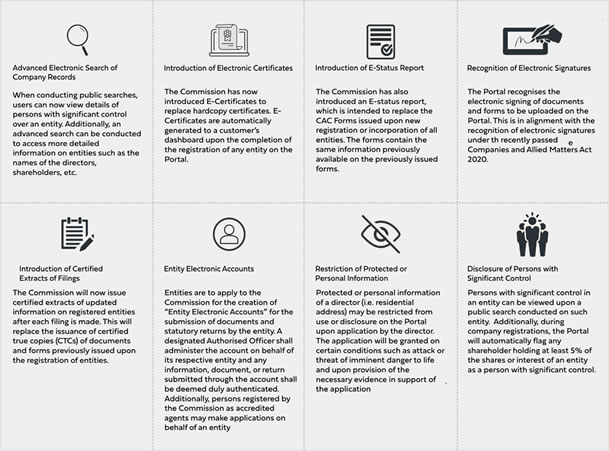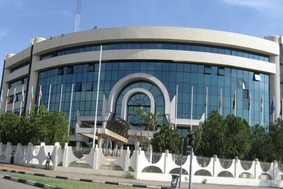Prospects of digitization of the CAC registration process

Feature Highlight
The Corporate Affairs Commission can further upgrade its portal and the services provided on it to improve Nigeria’s ease of doing business.
Introduction
On the 4th of January, 2021, the Corporate Affairs Commission (the Commission), in line with its commitment to improving the ease of business registration in Nigeria, deployed a new Company Registration Portal (the Portal), to cater for the end-to-end digitization of the pre-incorporation and post-incorporation processes of the Commission. This effort is in accordance with the Federal Government’s mandate of improving the ease of doing business in the country.
The Commission had initially launched an online system for company and business registrations on the 2nd of February, 2015. As of 2018, some of the reforms completed by the Commission with regards to business registration included the electronic reservation of business and company names, digitization of the payment of stamp duties, and automatic generation of tax identification numbers by the Federal Inland Revenue Service upon completion of registration. The online system, however, failed to deliver far-reaching digitization of the entire registration process, thus necessitating the deployment of the Portal.
The Portal was developed in line with the Companies Regulations 2021, issued in December 2020, which encourages the use of technology for service delivery. The Portal aims to, amongst other benefits, improve access to the Commission’s services, standardize service requirements, minimize the need for physical interaction during the process, and ultimately eliminate administrative delays associated with dealing with the Commission. Given the COVID-19 pandemic and resultant government restrictions on physical gatherings as well as the transition to remote working, the deployment of the Portal became very crucial in order to limit the need for physical visitation to the Commission’s offices.
This article seeks to set out the key features of the Portal, highlight any deficiencies observed and make recommendations to improve the Portal in terms of its functionalities and the services to be provided on it.
Key Features of the Portal
Some of the new functionalities and features introduced on the Portal are below.
Deficiencies of the Portal and Recommendations
1. Inclusion of Additional Payment Gateways
Payments on the Portal can only be made through one payment gateway. The implication of a single payment gateway is that where there is any network downtime or other technical issues, customers will be required to make payments physically at the bank in order to complete such payment before proceeding with the application on the Portal. It is, therefore, our recommendation that more payment gateways should be onboarded and adopted for payments on the Portal in order to widely cater for all forms of payments being made by customers within and outside Nigeria.
2. Revision of Refunds, Cancellation and Returns Policy
Currently, customers are required to send in applications with supporting evidence to the Commission to process refunds, and refunds are only processed once the Commission confirms the authenticity of the refund application. This process is, however, protracted. To curb this deficiency, the Commission has informally indicated its intention to adopt a customer electronic wallet on the Portal wherein any money to be refunded will be credited and from which payments can be made in subsequent transactions. In addition to this, we recommend that customers should be able to make refund requests directly on the Portal with updates provided. Also, an option for such refunds should be made directly to the customers’ bank accounts.
3. Adoption of Artificial Intelligence (AI)
The administrative delays often encountered by customers when dealing with the Commission is one of the factors adversely impacting the ease of starting a business in Nigeria. It is our understanding that despite the introduction of the Portal, the Commission stills relies on approving officers to evaluate certain applications made by customers. We recommend that the integration of AI into the Portal would help to digitize the services to be provided by the approving officers. Furthermore, the assimilation of AI into the Portal will eliminate the need for returning customers to continuously impute information previously provided, through the introduction of an auto-fill response function on the Portal.
4. Ease of Documentation Upload
Although the Portal already allows for the upload of documents, it is, however, observed that customers are not given the option to preview such uploaded documents on the Portal prior to submission. Neither does the Portal include the option to delete and re-upload a document after submission. It is our recommendation that these features should be included on the Portal.
5. Sensitization of the Public and Stakeholders
The deployment of the Portal has introduced a number of changes to the previous pre- and post-incorporation processes as highlighted above. In order for there to be a seamless transition from the old regime to the current one, we think it is useful for the Commission to continue to conduct series of sensitization programmes for the general public and key stakeholders aimed at providing clarity about how these changes will work practically. This would assist in the smooth transition to the new regime and be particularly helpful, for instance, with respect to the transition from CTCs, which are typically requested for by commercial banks as well as regulators, to certified extracts.
6. Access to Information and Business Support Services
The Commission may consider utilizing the Portal as a platform through which new businesses may access useful information for their activities post-incorporation. Such activities may include application for regulatory and operational licenses and permits, and registration with tax authorities. Also, the Portal can be used as a platform for accessing business support services e.g. financing and available relief funds, as well as liaising with other regulators as will be required by the new businesses. This will, however, require public private partnerships between the Commission and relevant private institu-tions that are willing and able to provide such services and leverage technology. We note that this would be beneficial, particularly to small and medium-sized enterprises (SMEs).
This is the current practice in South Africa, where the company registration portal, BizPortal, has embedded in it links that are able to redirect business owners to business support services such as loan schemes, SME relief funds, crowdfunding, etc. The BizPortal also provides a range of similar services, including tax registration, domain name registration and the opening of business bank accounts. This practice is made possible through a collaboration between the South African Companies and Intellectual Property Commission, South African Revenue Service and a number of reputable banking institutions.
Conclusion
In 2020, Nigeria was ranked 105th out of 190 economies with respect to starting a business, according to the 2020 Doing Business (DB) report of the World Bank. The ranking took certain parameters into consideration such as the procedures for legally starting and formally operating a company; the time required to complete each procedure; and the cost required to complete each procedure.
The ease of starting a business in Nigeria needs further improvement. This can happen, for instance, if the Commission further upgrades the Portal and the services provided, hopefully taking some of the above recommendations into consideration.
The Portal is highly commendable as it aligns with global best practices, especially given the impact of the ongoing COVID-19 pandemic on administrative procedures in general. It is crucial that the Commission continues to embrace technology for the delivery of its services and eliminate manual processes for pre-incorporation and post incorporation procedures.
Detail Commercial Solicitors is distinct as Nigeria's first commercial solicitor firm to specialize exclusively in non-courtroom practice. Based in Lagos, Nigeria’s business capital, DETAIL is totally committed to its clients’ business objectives and reputed for dealing with the minutiae. Email: info@detailsolicitors.com
Other Features
-
At 50, Olajide Olutuyi vows to intensify focus on social impact
Like Canadian Frank Stronach utilised his Canadian nationality to leverage opportunities in his home country of ...
-
Reflection on ECOWAS Parliament, expectations for the 6th Legislature
The 6th ECOWAS Legislature must sustain the initiated dialogue and sensitisation effort for the Direct Universal ...
-
The $3bn private credit opportunity in Africa
In 2021/2022, domestic credit to the private sector as a percentage of GDP stood at less than 36% in sub-Saharan ...
-
Tinubunomics: Is the tail wagging the dog?
Why long-term vision should drive policy actions in the short term to achieve a sustainable Nigerian economic ...
-
Living in fear and want
Nigerians are being battered by security and economic headwinds. What can be done about it?
-
Analysis of the key provisions of the NERC Multi-Year Tariff Order ...
With the MYTO 2024, we can infer that the Nigerian Electricity Supply Industry is at a turning point with the ...
-
Volcanic explosion of an uncommon agenda for development
Olisa Agbakoba advises the 10th National Assembly on how it can deliver on a transformative legislative agenda for ...
-
Nigeria and the world in 2024
Will it get better or worse for the world that has settled for crises?
-
The Movers and Shakers of Nigeria 2023
This special publication profiles 25 people and institutions based on their societal or industry impact in 2023.
Most Popular News
- IFC, partners back Indorama in Nigeria with $1.25 billion for fertiliser export
- Ali Pate to deliver keynote speech at NDFF 2024 Conference
- Univercells signs MoU with FG on biopharmaceutical development in Nigeria
- CBN increases capital requirements of banks, gives 24 months for compliance
- CBN settles backlog of foreign exchange obligations
- Nasdaq Dubai welcomes $600m sukuk listing by Islamic Development Bank












